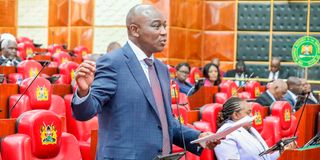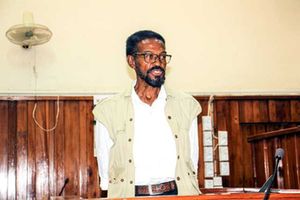
A queue at the Department of Immigration Services Passport control office at Nyayo House in Nairobi for application and renewal of passports on May 21, 2018.
A Bill seeking to enable Africans in the diaspora but with Kenyan roots to acquire citizenship will generate Sh40 million as revenue annually for the government if it’s enacted into law.
According to an analysis by the Parliamentary Budget Office (PBO), the Bill sponsored by Suba South MP Caroli Omondi will further rake in 41 million in its second year of implementation and another Sh42 million in the third year.
The PBO, which advises MPs on technical budgetary matters based their figures on the four million Kenyans who are in diaspora with 0.01 who are of Kenyan ancestry, will take advantage of the Bill and acquire Kenyan citizenship.
“The number of Kenyans in the diaspora is approximately four million. It is assumed that 0.01 percent are not registered Kenyans by ancestry and will apply every year seeking Kenyan citizenship,” reads the PBO report.
“It is provided that the cost of citizenship application for dependents and Children of Kenyan citizens is Sh100,000 as gazetted by the Cabinet Secretary responsible for immigration services. It is therefore estimated that the cost of such an application for their descendants will also be Sh100,000
The office projects that the number of Kenyans in a diaspora is expected to grow at two percent per annum.
According to the PBO, similar provisions of giving citizenship to people with roots in a particular country exist in Ireland, Italy and Nigeria.

Suba South MP Caroli Omondi makes his contributions during a past session in the National Assembly.
“Individuals with Irish ancestry who were born outside of Ireland may be eligible to obtain Irish Citizenship through a process known as Foreign Birth Registration (FBR),” reads the PBO report.
This process allows those who have a parent or grandparent born in Ireland to apply for citizenship, thereby establishing their entitlement to Irish nationality.
Ireland also allows citizenship through grandparents. For instance, If you have an Irish-born grandparent, you can apply for Irish citizenship through the Foreign Births Register.
"Right of blood"
“In some cases, even great-grandparents can be considered, provided your parents registered before you were born,” reads the report.
In Italy, citizenship is granted through the principle of jus sanguinis, or "right of blood", which allows individuals with proven Italian ancestry to apply for citizenship.
This policy means that if an individual can establish a continuous lineage of Italian descent, they may be eligible for Italian citizenship, regardless of the number of generations between them and their Italian ancestors.
Mr Omondi’s Bill- the Kenya Citizenship and Immigration (Amendment) Bill, 2024 seeks to enable persons born outside Kenya with Kenyan descent to acquire citizenship through ancestry subject to various conditions.
The Bill is currently before the Budget and Appropriations Committee for implications if implemented before formal introduction into the House.

The Kenya Citizenship and Immigration (Amendment) Bill, 2024 sponsored by Suba South MP Caroli Omondi seeks to enable Africans in the diaspora but with Kenyan roots to acquire citizenship through an expedited process.
The proposed amendment provides that a person born outside Kenya but who claims Kenyan descent by ancestry may apply for citizenship subject to fulfilling certain conditions including such as verification of their ancestry and proof of not having been convicted of a criminal offence or sentenced for imprisonment for a term not exceeding six months.
Other conditions include proof of reasonable financial resources as may be prescribed and proof of ability to make substantial contributions to the development of Kenya through investment or other related ventures.
The conditions are put so as to deter influx of criminals in the country who will not add any economic value.
The Bill provides that before determining the ancestry of such a person (s) eligible to apply for Kenyan citizenship, a genetic genealogy will be conducted by Kenyan authorities to determine the ancestry of an individual.
Genetic genealogy is the use of DNA testing in combination with traditional genealogical and historical records.
It involves the use of genealogical DNA together with documentary evidence and family history profiles to determine biological relationships between or among individuals.
Article 15 of the Constitution provides for citizenship by registration where a person can apply for citizenship in Kenya if they meet certain criteria, such as having been married to a Kenyan citizen for at least seven years, having lawfully resided in Kenya for more than seven years; and having been adopted as a child by Kenyan Citizens.
The Constitution under Article 16 further highlights that a Kenyan citizen by birth retains their citizenship even if they acquire the citizenship of another country.
Kenya is seeking to become the third country in Africa after Ghana and Nigeria to introduce such a provision in their laws.








